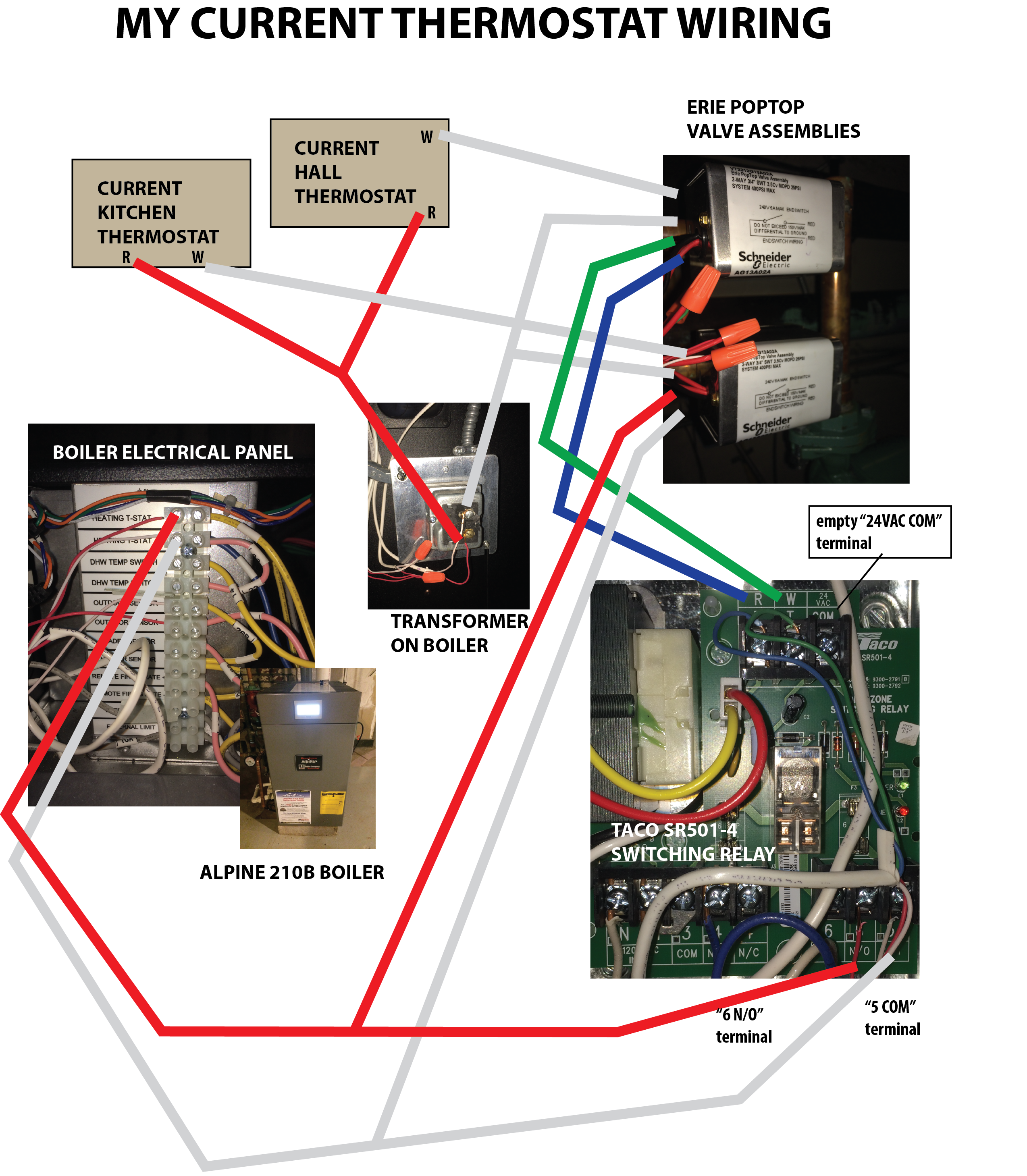Welcome! Here are the website rules, as well as some tips for using this forum.
Need to contact us? Visit https://heatinghelp.com/contact-us/.
Click here to Find a Contractor in your area.
If our community has helped you, please consider making a contribution to support this website. Thanks!
Help with adding a C wire for a Smart Thermostat
Options
ColonelSanders
Member Posts: 7
Friends,
I am trying to replace my current hall thermostat but it only has an R and W wire. I have inluded a wiring diagram of my system in the hope that you could tell me what I need to do to get a working C wire. Any thoughts?
Many regards,
Colonel Sanders

I am trying to replace my current hall thermostat but it only has an R and W wire. I have inluded a wiring diagram of my system in the hope that you could tell me what I need to do to get a working C wire. Any thoughts?
Many regards,
Colonel Sanders

0
Comments
-
-
What he said ^^
You'll have to snake up a wire to the thermostat for C terminal which will connect to the 2nd screw on that transformer.0 -
Thank you. Does a way exist that doesn't involve snaking a new wire? Maybe with a "Common Maker" product or something similar?0
-
Agree with others, your common needs to hook with the white wires at the transformer.
As far as if there's a way to do it without snaking a new wire, I'd be grabbing my poke saw and mud pan.
Single pipe 392sqft system with an EG-40 rated for 325sqft and it's silent and balanced at all times.
0 -
Why not first check to see if there is another wire under the insulation cover of your existing thermostat wire feeding the T-stat. when I purchase low voltage wire, I always buy minimum of 4 wire. Hopefully for your sake the original installer did too.
Good luck!
Robert O'Connor/NJ0 -
Thank you everyone, I greatly appreciate your advice. The customer support representative from my wifi thermostat company has suggested I use a step-down transformer and an Isolation relay to avoid snaking a new wire. Is this good advice?
Also, I just checked the insulation cover and regrettably there were only 2 wires. It was worth a shot though!0 -
Sure, if you have a place to put the extra transformer and relay. Though, it will be two more items wasting power in the system, albeit not much it's still a tiny increase as well as more things to fail.ColonelSanders said:Thank you everyone, I greatly appreciate your advice. The customer support representative from my wifi thermostat company has suggested I use a step-down transformer and an Isolation relay to avoid snaking a new wire. Is this good advice?
Also, I just checked the insulation cover and regrettably there were only 2 wires. It was worth a shot though!Single pipe 392sqft system with an EG-40 rated for 325sqft and it's silent and balanced at all times.
0 -
-
Colonel,
Try using a different smart stat that doesn't require the C wire.
Lux just came out with one that can be battery powered or C wire. I have not used it yet, but like the idea of making it real easy for the retrofit.
Also, I just installed an EcoBee 3 and it had the kit in the box with the stat. Again, I didn't have to use the kit since we had the extra wire.
Enjoy
Dave Holdorf
Technical Training Manager - East
Taco, Inc
0 -
The plot, like Grandma's gizzard gravy, is thickening!
On Robert's advice, I did a more thorough exam of the wires on the back of the thermostat and buried deep down was an unconnected red wire!
In the basement, I found that the 3 wires were then spliced into 4 low voltage wires (see new diagram)—2 of which were connected to an (old?) transformer above the boiler. Can I use this red wire as my common as is or do I need to connect it to the "white terminal" on the other transformer?
Again, thanks for your help and for your patience. When it comes to HVAC, I am just learning the ropes (wires).0 -
Anyone?0
-
You can use any wire... for anything. One thing to do, though, before starting to do that, is to mark both ends of the wire the same. Suppose, for instance, you consider that unused red wire. Mark it at one end -- perhaps tape around it, or paint, or nail polish. Or something. Then find the other end in the basement. Make sure that a) it really is the other end of the same wire, b) it really is connected through, and c) it really isn't connected to anything else. Then mark it the same way.
Now you have the old red and white thermostat wires -- and a nice wire to use as the common wire. No problem.
Now wire it up exactly as is shown on the instructions. I would use the same transformer, though, provided it has enough capacity, rather than the old one. Using two different transformers is subject to a variety of interesting electrical problems, most of which will burn out your fancy thermostat, or the valve controller, or both.Br. Jamie, osb
Building superintendent/caretaker, 7200 sq. ft. historic house museum with dependencies in New England0 -
Jamie,
Thanks for your help. How do I determine if the transformer has the proper capacity? The white terminal is currently connected to two different valve assemblies, as shown in my initial diagram.
Regards,
the Colonel0 -
Thermostats take very little power to operate, so it is likely that there is enough. One should be able to find on the valves and the thermostat the power requirements, though, and add them up and compare it to the rating on the transformer.Br. Jamie, osb
Building superintendent/caretaker, 7200 sq. ft. historic house museum with dependencies in New England0 -
sweet deal!! a hidden wire.. lol the color doesn't mean a thing if both ends are not connected to anything.
Connect it as mentioned above and let us know how you make out...0 -
Oh my garsh. I re-routed the secret red wire to the white terminal on the transformer and hooked up the thermostat according to the instructions. It worked perfectly as soon as I powered it on. Hopefully now I'll be saving a pretty penny on my heating bills AND I have learned a little something about my system in the process. Thank you to everyone for your guidance.0
Categories
- All Categories
- 87.5K THE MAIN WALL
- 3.3K A-C, Heat Pumps & Refrigeration
- 61 Biomass
- 430 Carbon Monoxide Awareness
- 122 Chimneys & Flues
- 2.1K Domestic Hot Water
- 5.9K Gas Heating
- 117 Geothermal
- 170 Indoor-Air Quality
- 3.8K Oil Heating
- 78 Pipe Deterioration
- 1K Plumbing
- 6.6K Radiant Heating
- 395 Solar
- 15.9K Strictly Steam
- 3.5K Thermostats and Controls
- 57 Water Quality
- 51 Industry Classes
- 51 Job Opportunities
- 18 Recall Announcements






